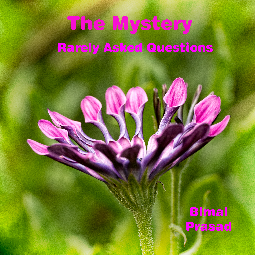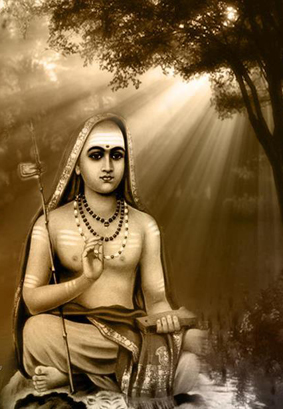| Claim against Swamiji (SSS) |
| Big fuss on whether avidya =mAyA |
| · Swamiji does not like tarka or reasoning |
| · Swamiji does not admit of avidyA in deep sleep |
| · Swamiji does not endorse prakarana works, as he says they are not written by Shankara |
| · Swamiji claims no role for bhakti in the advaita tradition |
| · Swamiji does not accept that an enlightened soul may still suffer the consequences of past deeds |
| · Swamiji advocates learning from books only, and being self taught without a teacher |
| · Swamiji overuses the phrase adhyAropa-apavAda giving the impression it his discovery |
| · Swamiji is not of the tradition |
| · Swamiji claims he is right and everyone else is wrong |
Tag Archives: self-knowledge
The Mystery – Part 6

Continuing this new, short series presenting the booklet by Bimal Prasad, in which he answers some ‘Rarely Asked Questions’ on Life. Primarily from the perspective of Advaita, questions addressed include the nature of happiness, consciousness, mind and ego. There is also practical guidance on meditation in the final chapter. Answers are relevant and succinct, so that many of the issues of interest to the seeker are covered.
This sixth part looks at the relationship between Consciousness, witness and ego, at the nature of the Self and reality, and asks what we mean by Self-knowledge. See the Contents List or go straight to Part 6 of the series.
The complete (electronic form) booklet may also be purchased from Amazon.
Q. 387 – Value of Self-knowledge
Q: At the end of the day, what does knowledge of self give us ? It does not help to answer the burning question of why the appearance/dream/mAyA that we are experiencing as humans or animals exists. Also, it appears that even if one attains knowledge of self in one life, he/she can actually become a cockroach in the next due to karmic effect, ie we are not really liberated from the brith-death cycle. The only benefit I do see in a life in which one attains knowledge of self is that one might lead a life devoid of misery in the mind as we sail through good and bad times, even though we may experience physical pain.
A (Dennis): Self-knowledge removes Self-ignorance and it is that which makes us think we are limited, unhappy, doomed to old age and death. With Self-knowledge we realize that we are not human, living in an inhospitable world; we are brahman. The world appears as separate because of our ignorance. On gaining Self-knowledge, we realize that it’s substance is nothing but brahman.
From the perspective of the ignorant person, there is rebirth (possibly as a cockroach) and we are subject to karma. With Self-knowledge, we realize that there is no person, no birth or rebirth, no death, no creation.
The idea that knowledge is pointless is actually the main argument of the pUrvamImAMsika philosopher. They believe that only the karmakANDa portion of the Vedas is relevant – rituals that we have to perform in order to gain benefits. They say that the Upanishads etc are only supporting material to be meditated on. In the Brahmasutras, I.1.4, Vyasa effectively refutes all those philosophers who deny that brahman is the principal topic of the Vedas. But he does this with the single word ‘tu’ (tattu samanvayAt). Fortunately Shankara takes the opportunity to take up arms against pUrvamImAMsA. Whilst he agrees that knowledge in itself is often useless – we need actually to do something in order to gain some benefit – there is one situation in which ONLY knowledge bears fruit. That is when the problem is one of ignorance. The classic example is the rope mistaken for a snake. As soon as we find out that it is a rope, all our fears etc disappear. And our essential problem in life is that we believe we are a limited person. The knowledge that is to be gained from Advaita is that we are brahman – and that reveals that we have no real problems at all.
Q.384 – Dark night of the soul
Q: Please help me.I had a temporary glimpse of reality around 15 months ago by following 8 fold path. I tried to penetrate the question of suffering and learned that everything wants to come into Equilibrium (a known chemistry fact) due to which my thought trains stopped and I got an instant realization of something called reality. After that, I experienced I am a silent witness and not mind, body, ego, etc.
This faded away after some time and now I am in mental anguish and turmoil. I don’t know what is happening in my mind but it is disturbed or in what people call the “Dark night of soul”. Every joy is lost now; I get angry easily and have feelings of despair from something. Maybe it is because I didn’t discipline my mind with ethics before starting this practice for enlightenment. Please save me now. Whatever is going on in my head, save me from it. I don’t know how to complete surrender unto reality and may be this is due to the hold of ego. Please help!
A (Dennis): The teaching tradition of Advaita is all about Self-knowledge. You listen to the teaching from a qualified teacher (ideally) or read about it and discuss it (less good). You ask questions about it to resolve your doubts. Eventually, you realize that what is being said is true and that is that. In theory!
The problem is that you need a clear, self-controlled mind and some trust in the teacher, the ability to discriminate and so on. These ‘skills’ are not really a part of Advaita – they are mostly lifted from Patanjali’s Yoga system. If you have no mental discipline along these lines, you are never going to be able to assimilate the teaching. You need at least a medium level of attainment. With that you can take on board the knowledge and then continue your practices until you reap all the other benefits (peace of mind, fearlessness and so on).
From what you say, I would advise that you forget about Self-knowledge for a while and concentrate on acquiring the mental skills. Meditation is invaluable. And, if you have no religious-type outlook (praying to a god and so on), then the practices of karma yoga are the other main route – doing what is in front of you because it needs doing, ignoring desires and not expecting any results. And so on!
I do not know anything about Buddhist methods so cannot really comment. I would forget about ‘dark nights’. The main thing to remember, even if you don’t yet believe it, is that the world is not absolutely real. Your body, mind and everything else have empirical reality only, depending ultimately on Consciousness, which is the only reality. And you are That.
‘Ego’, self, and metaphysics – Part V
From these considerations it may be seen that the boundaries between the normal and the abnormal, psychology and spirituality, medicine and metaphysics are not so well defined after all; they are not so (separate and apart) in principle, despite the attempts of modern Western science at so dividing and separating them. Our age is one in which empiricism, along with individualism and humanism (these last two almost equivalent, interchangeable terms), its ideological or philosophical underpinnings, still holds sway, although perhaps in its last, declining, phase. Continue reading
Reflections on Body-Mind and Liberation
 There has been much healthy debate recently on the Advaita Vision Blog about Liberation, who or what is a jnani or jivanmukta, and what it means to follow traditional Advaita. The theme of this post is that we cannot resolve such questions without first gaining a clear understanding of the body-mind and its role in the context of Liberation. What follows are some reflections inspired by a spirited discussion with Ramesam, with due credit to him for stimulating many of the thoughts below. Any errors or possible misunderstandings are entirely my fault. Or perhaps not, since “Words fall back from it.” Continue reading
There has been much healthy debate recently on the Advaita Vision Blog about Liberation, who or what is a jnani or jivanmukta, and what it means to follow traditional Advaita. The theme of this post is that we cannot resolve such questions without first gaining a clear understanding of the body-mind and its role in the context of Liberation. What follows are some reflections inspired by a spirited discussion with Ramesam, with due credit to him for stimulating many of the thoughts below. Any errors or possible misunderstandings are entirely my fault. Or perhaps not, since “Words fall back from it.” Continue reading
Language and Teaching
 I think we have probably had enough discussion on the ‘Experience versus Knowledge’ question. I cannot imagine many visitors wanting to read through 50+ comments on the topic! So here is an article that I have just had published in the Newsletter of Ramana Maharshi Foundation UK. It is on a subject closely related to the above question and indeed was touched upon in some of the comments…
I think we have probably had enough discussion on the ‘Experience versus Knowledge’ question. I cannot imagine many visitors wanting to read through 50+ comments on the topic! So here is an article that I have just had published in the Newsletter of Ramana Maharshi Foundation UK. It is on a subject closely related to the above question and indeed was touched upon in some of the comments…
Language and Teaching
Language is something we tend to take very much for granted. When someone says something to us, and providing we recognize the words, we think that we understand what it is that the speaker intends to communicate. And we respond appropriately. This is often not verbal – when it is, there is a subsequent opportunity to resolve any misunderstanding. Our response is usually to form an immediate mental opinion or judgement upon what has been said. And this is probably not merely a spoken or unspoken comment upon the particular topic expressed but also upon the person who made the statement. This all happens instantaneously and automatically. Thus it is that it can actually be worse for our comprehension if we already know something about the topic to begin with than if we are completely ignorant. What we take in will be significantly coloured by what we believe to be our prior knowledge (which may actually be ignorance). Continue reading
‘ego’, self, and metaphysics – Part lV
In the Buddhist perspective, the ego or self as ordinarily considered in Western traditions (i.e., as soul or person), is a non-self, actually a non-entity (anatta). Hence the suffering, which stems from an experience -ultimately illusory- of separation and vulnerability.
Here we have to consider two things. First, according to Mahayana Buddhism, Adi-Buddha, equivalent to Dharmakaya – the highest metaphysical, or divine, level – represents that unique Being or Divine ‘State’, pervading all manifestation as Buddha-nature; and second, the notion of the Self (Atman, derived from the Hindu Vedanta) is not only compatible with that view, but also with that of the Spirit in Christianity and in Islam.
As to the soul (metaphysics and theology), though intrinsically perfect or whole in itself (one could add: in ‘primordial man’ –the purusha or Hiranyagarbha of Hinduism)- it experiences imperfection, self-limitation, anxiety and doubt in its state of (aparent) separation -the ‘fallen state’. Being, not just potentially, a ‘focal point of the Universe’, yet it becomes, through ignorance and self-will, the subject of illusions, attachments, and passions which lead to that predicament. Its condition is thus ambivalent; it can orient itself upwards (or towards the centre) – to ‘holiness’ and integration – or downwards, pulled by its ‘lower nature’ (nafs in its lower stages, according to Sufism). The end result will be either self-denial, or self-assertion; self-giving, or ego-centeredness. Inevitably, this latter tendency, based on ignorance, can only lead to an unwanted result: dispersal, disintegration, and suffering. Alas!, on the whole, if not in principle, psychiatry is not interested in this distinction or dichotomy; but let not anything else be said about this at this point.
From the viewpoint of advaita vedanta, all of what is described in this paragraph – and what follows – pertains to the empirical, relative (ontological and epistemological) level: mithya (or vyavahara), in other words. Continue reading
A-U-M Awakening to Reality – Review of book
‘Lucid and exhaustive of most important book in Advaita Vedanta’
The Mandukya Upanishad, the shortest (it has just 12 verses) and , according to a general opinion, the most important of the 12 main Upanishads, has the added interest in being associated with the authoritative karikas of Gaudapada, grand-mentor of Shankaracharia, the initiator of Advaita Vedanta. Of the former it has been said that his is ‘a rational analysis of the totality of our experience in all three states: waking, dreaming, and deep sleep. Incomplete and insufficient will be any philosophy that is based on the waking state alone’ (Swami Brahmananda).
‘When everything has been said, the fact remains that Vedanta is the only way of thinking that claims to study life in all its aspects in a scientific manner. It treats of truth, wisdom, and happiness, subjects of eternal interest to mankind. The credit of having brought to the notice of thinkers the value of its all-comprehensive method revealed in the Upanishads, and of having successfully built an impregnable system on that solid basis, will ever belong to Gaudapada.’ (Swami Satchidanandendra Saraswati).
This new book, authored by the well-known (and, one could say, prolific writer in the field of Advaita Vedanta – this is his 7th book), Dennis Waite, has several features that make of it an important addition to the literature in this specialized area, one that is becoming much better known than it was some 10-20 years ago.
Beginning with a few general remarks, something that strikes the reader is the clarity of the writing and the logic of the exposition of its contents which, at first sight, appears to be an introductory text for the un-initiated. Far from it! – and it is not a question of its length (420 pages) or even of the exhaustive coverage of everything that is relevant to the Upanishad itself and Gaudapada’s running commentary in the karikas. Clear and didactic it is, but the tools (armamentarium), organization of the work, and employment of many important Sanskrit words together with their English translation, plus a long Glossary (41 pp.), make of this book an indispensable reference for the modern reader of both this important Upanishad and Gaudapada’s contribution.
An important feature of the book consists in the numerous references (81 in all!) – most of them with short-to-medium length descriptions of the tenets or arguments of the, mostly modern, authors consulted when DW was in the process of preparing this work (Annotated Bibliography – 33 pp.)
Apart from the illuminating Introduction (36 pp.) and ‘What the Mandukya Upanishad is About’ at the beginning, the following 7 sections are: The World Appearance, Causality, Creation, Nature of Reality, Self-Knowledge, Practical Aspects, and Conclusion. They are all important, certainly, but I found ‘Nature of Reality’ to be like a centre-piece.
There are 7 Appendices at the end, comprising altogether 95 pp. To give one an idea of the completeness of the work, one of the Appendices (No. 5) deals with pronunciation and transliteration, using a recently proposed method: ITRANS. Lastly, a full Index, containing also a list of all the karikas mentioned in the book. AM
Life is a dream – The world is real
DIALOGUE in Quora
A. Of course, if everything is like a dream (mithyA), then the sages and their scriptures are a part of that dream. But that doesn’t necessarily mean that the teachings and the scriptures are not useful for awakening from the dream.
B. That is true, in my understanding. ‘Life is a Dream’ (Calderón de la Barca’s play), ‘All the world’s a stage’ (Shakespeare). As to Vedanta, here is what a sage (among so many others) has said: “Vedanta plays the role of the dream lion in this world. Vedantic knowledge itself is part of the illusory world. But then it dissolves the entire illusion of this world, revealing reality as it is.” Sw. Parthsarathy.
A. If no one dies, then no one is enlightened either, and yet we still talk as if people really do die and really do become enlightened.
B. True also. That modifier, ‘as if’, is crucial.
In the next para. you write: “…an individual who appears to exist while not really existing (AS AN INDIVIDUAL) has appeared to become enlightened while not really being enlightened (AS THE PURPORTED INDIVIDUAL).” I have taken the liberty of adding the capital letters, for advaitic sense. Further, while ‘everybody is enlightened’, as Neo advaitins claim, ‘no one is enlightened’, as the sage Gaudapada declared. Are these two seemingly contradictory statements true – and in what sense? *
A. I think the problem with brain damage is the possibility that a j~nAnI [sage] would lose most or all of the knowledge (including Self-knowledge) that he gained through his studies.
B. This is as seen from the vyavaharika (empirical) perspective, which cannot be denied (only understood). Jñani/s (sages) also experience thoughts and emotions. With them, these either quickly disappear, or are transmuted or resolved into consciousness; in fact, they are only consciousness, as mind is also a projection of consciousness.
Something more for pondering: “People forget the reality of the illusory world”. Huang Po.
(*) Gaudapada (Shankara, and the whole tradition of advaita Vedanta) deny multiplicity as being real. In essence ‘all is One’. The Neo-advaitin’s dictum (’everybody is enlightened’) is thus true and false at the same time.
